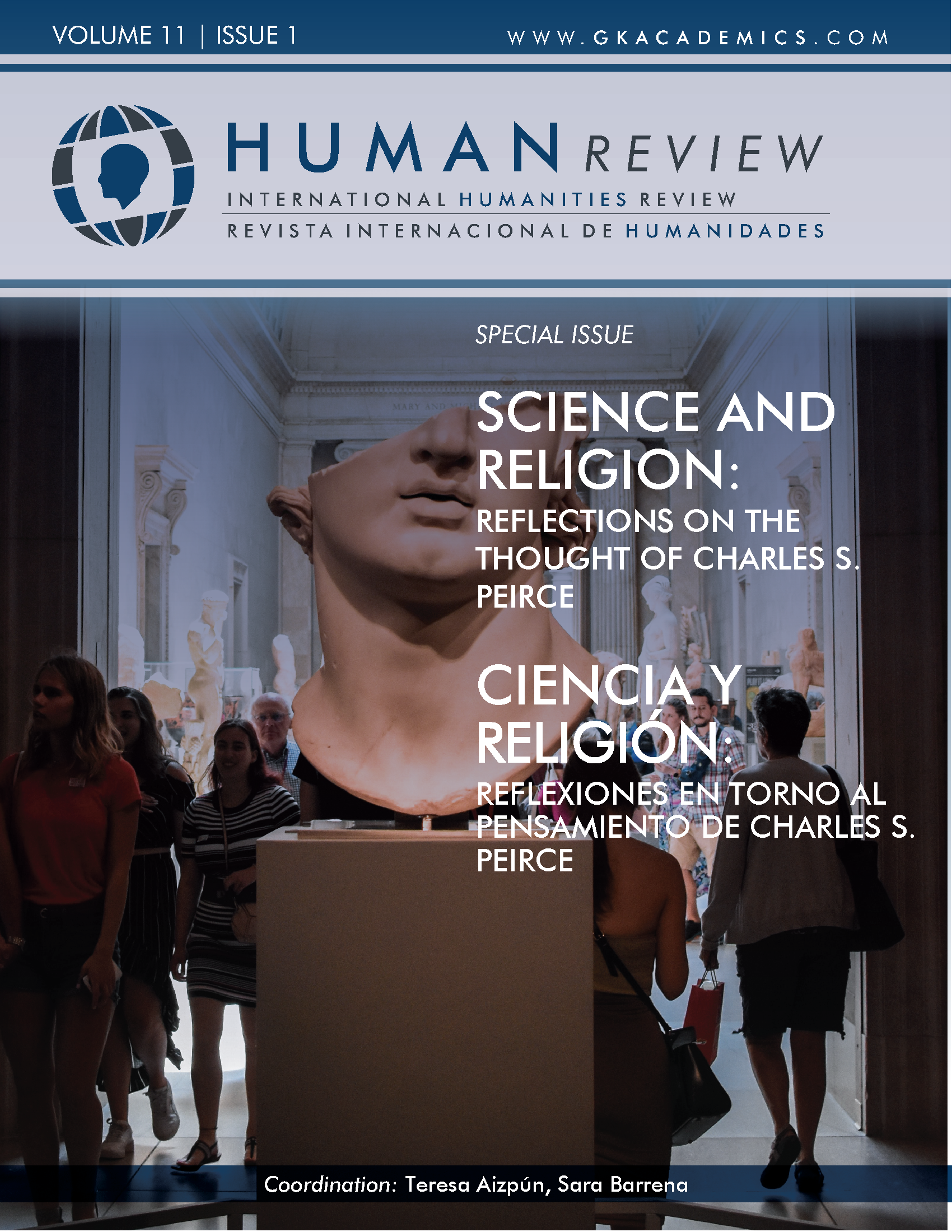Charles S. Peirce y el argumento olvidado en favor de la realidad de Dios
DOI:
https://doi.org/10.37467/gkarevhuman.v11.3219Palavras-chave:
Charles S. Peirce, Dios, Musement, AbducciónResumo
Esta colaboración aspira, sobre todo, a invitar a la lectura directa del artículo que Charles S. Peirce publicó en 1908 con el título «A Neglected Argument for the Reality of God». Más de un siglo después de su publicación original, aquel artículo de Peirce no ha perdido actualidad: su lectura atenta sigue dando mucho que pensar. Con esta finalidad, mi exposición está organizada en seis secciones: 1) introducción; 2) presentación de «A Neglected Argument for the Reality of God»; 3) la noción de realidad; 4) el corazón del «Neglected Argument»; 5) la discusión contemporánea: una respuesta a Oya (2021); y 6) conclusión.
Referências
Anderson. D. (1990). Three Appeals in Peirce's Neglected Argument. Transactions of the Charles S. Peirce Society, 26, 349-362.
Anderson. D. (1995). Strands of System. The Philosophy of Charles Peirce. Purdue University Press.
Anderson, D. (2013) The Pragmatic Importance of Peirce's Religious Writings. En D. R Anderson y C. R. Hausman, Conversations on Peirce. Reals and Ideals, (pp. 149-165). Fordham University Press.
Atkins, R. K. (2016). Peirce and the Conduct of Life: Sentiment and Instinct in Ethics and Religion. Cambridge University Press.
Ayim, M. (1974). Retroduction: The Rational Instinct. Transactions of the Charles S. Peirce Society, 10(1), 34-43.
Barrena, S. (1996). Charles S. Peirce: Un argumento olvidado a favor de la realidad de Dios. Introducción, traducción y notas, Cuadernos de Anuario Filosófico 34. http://www.unav.es/gep/Barrena/cua34.html.
Barrena, S. (2008). El "Argumento Olvidado" de C. S. Peirce cien años después: Dios, juego y símbolo. Methodus, 3, 23-45.
Barrena, S. y Nubiola, J. (2013). Charles S. Peirce (1839-1914): Un pensador para el siglo XXI. m Ediciones Universidad de Navarra.
Boulting, N. (2021). The God of Religion and the God of Philosophy Revisited: Hartshorne, Peirce, and Weil. Process Studies, 50(1), 88-106.
Cantens, B. (2006). Peirce on Science and Religion. International Journal for Philosophy of Religion, 59, 93-115.
Clanton, J, C. (2014). The Structure of C. S. Peirce's Neglected Argument for the Reality of God: A Critical Assessment. Transactions of the Charles S. Peirce Society, 50(2), 175-200.
Daniel-Hughes, B. (2015). The Neglected Arguments of Peirce's Neglected Argument: Beyond a Theological Dead-End. American Journal of Theology and Philosophy, 36(2), 121-139.
Hardwick, C. (ed.). (1977). Semiotic and Significs: The Correspondence between Charles S. Peirce and Victoria Lady Welby. Indiana University Press.
Johnson, H. C. (2006). Charles Sanders Peirce and the Book of Common Prayer. Elocution and the Feigning of Piety. Transactions of the Charles S. Peirce Society, 42, 552-573.
Mayorga, R. M. (2020). Las musas y el "argumento olvidado" de Peirce. Estudios Filosóficos, 69, 283-296.
Nubiola, J. (2004). C. S. Peirce y la abducción de Dios. Tópicos, 27, 73-93. https://www.unav.es/users/PeirceAbduccionDios.html
Nubiola, J. (2018). La realidad de Dios: Entender el Argumento Olvidado. En J. F. Trujillo (Ed.), El pragmaticismo de C. S. Peirce: comunidad, realismo y verdad, (pp. 223-238). Universidad del Valle. https://www.unav.es/users/LaRealidadDeDios2018.pdf
Orange, D. M. (1984). Peirce's Conception of God: A Developmental Study. Institute for Studies in Pragmaticism.
Parker, K. A. (1998). The Continuity of Peirce's Thought. Vanderbilt University Press.
Peirce, B. (1881). Ideality in the Physical Sciences. Little, Brown.
Peirce, C. S. (1908). A Neglected Argument for the Reality of God. The Hibbert Journal. A Quarterly Review of Religion, Theology and Philosophy, 25, 90-112.
Peirce, C. S. (1931-1958). Collected Papers, vols. 1-8. C. Hartshorne, P. Weiss y A. W. Burks (Eds.). Harvard University Press. Se citan por número de volumen y página, separados por un punto, e indicando seguidamente el año. [CP]
Peirce, C. S. (1966). The Charles S. Peirce Papers. [MS] 32 rollos de microfilms de los manuscritos conservados en la Houghton Library. Harvard University Library, Photographic Service. Para la numeración de los manuscritos se sigue el catalogo de R. Robin (1967). Annotated Catalogue of the Papers of Charles S. Peirce. University of Massachusetts Press.
Peirce, C. S. (1992-98). The Essential Peirce. Selected Philosophical Writings, vols. 1-2. N. Houser y C. Kloesel (Eds.). Indiana University Press. [EP]
Oya, A. (2021). Charles S. Peirce's Natural Foundation for Religious Faith. Teorema, 40(3), 87-99.
Pietarinen, A. & Bellucci, F. (2014). New Light on Peirce's Conceptions of Retroduction, Deduction, and Scientific Reasoning. International Studies in the Philosophy of Science, 28(4), 353-373.
Potter, V. (1976). C. S. Peirce's Argument for God's Reality: A Pragmatist 's View. En J. Armenti (Ed.), The Pappin Festschrift: Essays in Honor of Joseph Papin, (pp. 224-244). Villanova University Press.
Raposa, M. (1989). Peirce's Philosophy of Religion. Indiana University Press.
Raposa, M. (2020). Theosemiotic: Religion, Reading, and the Gift of Meaning. Fordham University Press.
Rodrigues, C. T. (2017). The Vagueness of the Muse—The Logic of Peirce's Humble Argument for the Reality of God. Sophia, 56, 163-182.
Rohr, D. (2019). The Humble Argument is Musement on God's Great Argument. Transactions of the Charles S. Peirce Society, 55(4), 429-453.
Schmidt, J. A. (2018). A Neglected Additament: Peirce on Logic, Cosmology, and the Reality of God. Signs, 9, 1-20.
Snyder, L. J. (2021). El Club de los desayunos filosóficos. Cuatro notables amigos que transformaron la ciencia y cambiaron el mundo. Acantilado.
Ward, R. A. (2018). Peirce and Religion: Knowledge, Transformation, and the Reality of God. Lexington Books.
Downloads
Publicado
Como Citar
Edição
Seção
Licença
Os autores/as que publicam nesta revista concordam com os seguintes termos:
- Os autores/as terão os direitos morais do trabalho e cederão para a revista os direitos comerciais.
- Um ano após a sua publicação, a versão do editor estará em acesso aberto no site da editora, mas a revista manterá o copyright da obra.
- No caso dos autores desejarem asignar uma licença aberta Creative Commons (CC), poderão a solicitar escrevendo a publishing@eagora.org.









